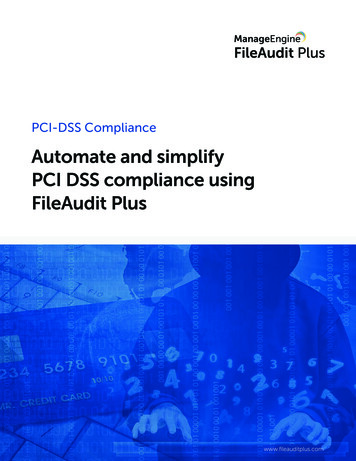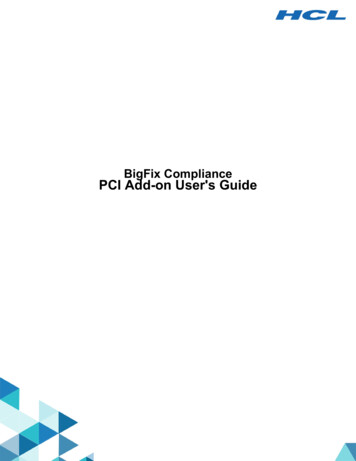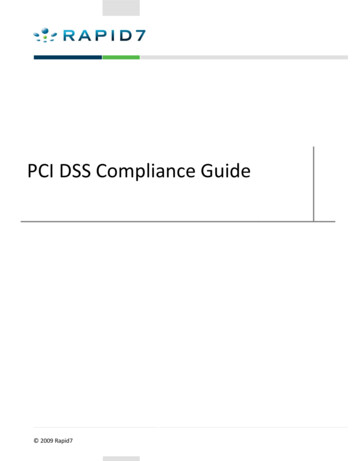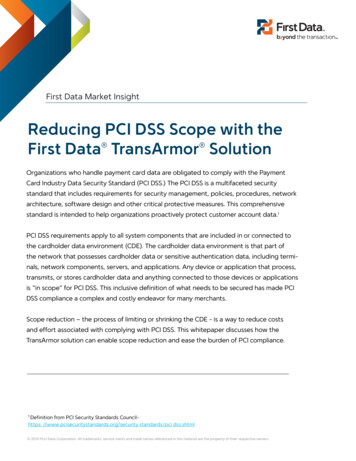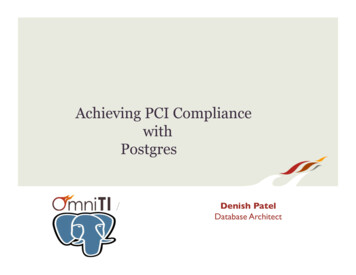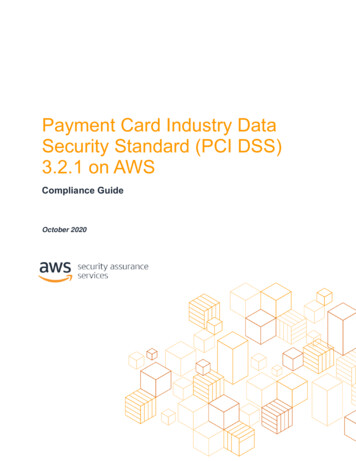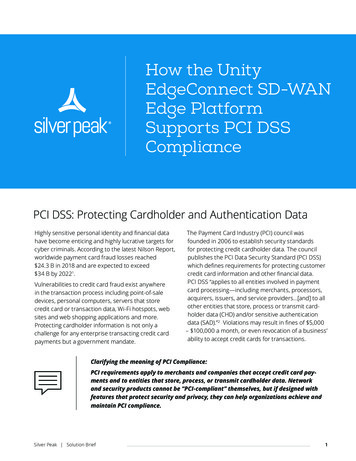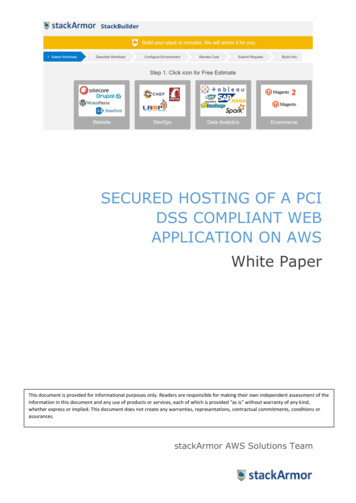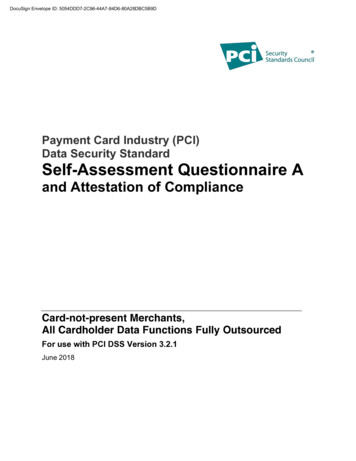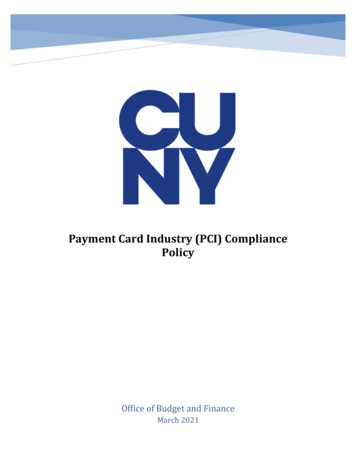
Transcription
Payment Card Industry (PCI) CompliancePolicyOffice of Budget and FinanceMarch 2021
Table of ContentsI.OVERVIEW . 2II.PURPOSE . 2III. ROLES AND RESPONSIBILITIES . 2IV. SCOPE . 3V.DEFINITIONS . 3VI. GENERAL REQUIREMENTS AND PROCEDURES . 3A.Storage of Sensitive Authentication Data and Cardholder Data . 3B.Access to Cardholder Data . 4C.Protecting Stored Cardholder Data . 4D.Retention of Cardholder Data . 4E.Disposal of Cardholder Data . 4F.Receipt of Cardholder Data via End-User Messaging Technologies . 5G.Self-Assessment Questionnaire (SAQ) . 5H.Internal and External Vulnerability Scans . 5I.Third-Party Vendor and Service Provider Compliance. 5J.Access to System Components containing Cardholder Data . 6K.Point-of-Sale (POS) Devices and Protection against Skimming and Tampering . 6L.Disposition of Point-of-Sale (POS) Devices. 6M. Protection of Networks and Systems . 6N.Annual PCI Awareness Training . 6VII. Fraud Reporting Procedures . 7VIII. Policy Implementation and Amendments . 7IX.HELPFUL RESOURCES. 8Appendix A: PCI-DSS DEFINITIONS . 9Appendix B: Merchant Levels . 11Appendix C: Merchant Level Requirements . 12Appendix D: Self-Assessment Questionnaires (SAQs) . 13Page 1
I.OVERVIEWIn 2006, the major credit card companies (American Express, Discover Financial Services, JCB, VisaInternational, and MasterCard Worldwide) formed the Payment Card Industry Security Standards Council(PCI-SSC) and established the Payment Card Industry Data Security Standard (PCI-DSS), a set of operatingand technical compliance requirements, to address the security concerns resulting from the widespreaduse of payment cards. Merchants, such as CUNY and its Related Entities, must comply with thesestandards regardless of the size of the institution and/or the number of payment card transactionshandled. Complying with the PCI-DSS will help protect Cardholder Data (see Appendix A for definition ofCardholder Data). This document sets forth the University’s policy for complying with the PCI-DSS.At a high level, the PCI-DSS is comprised of six categories and twelve requirements 1. PCI-DSS requirements(see Appendix C) are dependent on an organization’s merchant level (see Appendix B). PCI-DSScompliance is a continuous process. The University will be judged by its compliance with each of therequirements at all times and not at a particular moment in time. The University shall assess, remediate,and report its compliance status on an on-going basis.While the law does not mandate PCI-DSS compliance, non-adherence to PCI-DSS can subject theUniversity to significant financial and reputational risks. Failure to comply can result in: a) fines andpenalties imposed by payment card institutions and banks; b) monetary costs associated with legalproceedings, settlements and judgements; and c) suspension of the merchant account and the inabilityto accept payment cards for payment.II.PURPOSEThe purpose of this Policy is to provide the University with clear and manageable steps to protectcustomer Cardholder Data and to protect the University from a cardholder breach by complying with PCIDSS.III. ROLES AND RESPONSIBILITIESThe University is committed to safeguarding personal information conveyed in processing payment (debitand credit) card payments. The University shall be PCI-DSS compliant and use secure methods to processpayment card transactions to serve its students and the broader CUNY community. The Central Office isresponsible for ensuring that University-wide vendors and systems are PCI-DSS compliant. Colleges andRelated Entities are responsible for ensuring that their local vendors and systems are compliant. RelatedEntities must provide validation of their compliance to their supported College and/or the University.CUNY PCI Liaisons have been appointed at each College and shall be the point persons for all PCI relatedtasks and activities. College and Central Office management are responsible for maintaining andoverseeing compliance with this Policy within their line responsibilities.There are over 200 sub requirements to the 12 primary requirements. Please refer to the respective PCI-DSS requirements for the specificdetails.1Page 2
IV.SCOPEThis Policy applies to the Colleges and Related Entities that have access to Cardholder Data and to thepeople, processes and technology that handle Cardholder Data at or on behalf of CUNY. This includes, butis not limited to, any CUNY College, department, office, employee (full-time, part-time and temporary),student, vendor, software, computer, and/or electronic devices, involved in processing Cardholder Dataon behalf of CUNY.V.DEFINITIONS“College” means a constituent unit of the University, including without limitation senior and communitycolleges, graduate and professional schools, Macaulay Honors College, and the Central Office, as well asfund groups and organizations that are not legally separate from the University (e.g., the Queens CollegeAthletic and Recreational Fund, the college associations of Hunter College, the School of ProfessionalStudies and the Graduate School of Public Health and Health Policy).“CUNY” and “University” mean The City University of New York.“Related Entities” means the following types of entities and their subsidiaries, if legally separate from theUniversity: foundations, alumni associations, auxiliary enterprise corporations, college associations,student services corporations, childcare centers, performing arts centers, and art galleries, that acceptpayment cards using technology owned, operated or made available by a College and/or the University,such as servers, networks, hardware and software, and/or are using the name or a trademark of CUNY ora constituent unit of CUNY, in connection with its operations.“Payment card” means a debit or credit card.For list of PCI-DSS related definitions, see Appendix A.VI.GENERAL REQUIREMENTS AND PROCEDURESA. Storage of Sensitive Authentication Data and Cardholder DataStorage of electronic and/or physical Cardholder Data or Sensitive Authentication Data poses significantrisks and increases the number of requirements that must be satisfied to be PCI-DSS compliant.PCI-DSS prohibits the storage of Sensitive Authentication Data, even if the data is encrypted. SensitiveAuthentication Data includes the full contents of any data on a card’s magnetic stripe, card verificationcodes or values (CVC/CVV) and personal identification numbers (PIN).Electronic and physical Cardholder Data shall not be stored unless there is a justified business need to doso. Each College and Related Entity wishing to store Cardholder Data, specifically full Primary AccountNumbers (PANs), shall define and document the business need for storage, including maintaining a list ofall roles that require access to full PANs and staff who have such roles. Documentation must be kept upto-date and readily available in the event of an audit. Notwithstanding the foregoing, the followingCardholder Data may be retained after a transaction is successfully processed for the retention perioddescribed in this Policy: payment cardholder name, transaction authorization number, transaction date,and transaction dollar amount.Page 3
B. Access to Cardholder DataCardholder Data is classified as confidential data under the CUNY Data Classification Standard. Access toCardholder Data shall be restricted to those individuals whose job responsibilities require such access, ona strict need to know basis, as per CUNY IT Security Procedures, Section II, Access Issues. This includes fulltime, part-time, temporary, or contracted College or Related Entity employees. Offices and departmentsthat handle Cardholder Data shall define and document the roles and responsibilities of those individualswhose job functions require them to access Cardholder Data. It is crucial that individuals with CardholderData-handling job functions are instructed to not disclose any Cardholder Data, unless deemed necessaryby a supervisor in accordance with PCI-DSS requirements and CUNY policies.C. Protecting Stored Cardholder DataColleges and Related Entities with a justified business need to store Cardholder Data must ensure thatCardholder Data is appropriately protected. If there is a justified business need, the cardholder’s name,PAN, expiration date, and service code may be stored if protected in accordance with PCI-DSSrequirements. Masking the PAN anywhere it is displayed, such as on receipts, so that only the first sixand/or the last four digits are displayed is one method of protecting stored Cardholder Data. Othermethods include encryption or truncation.D. Retention of Cardholder DataAny Cardholder Data that must be retained after transaction authorization on the basis of a documentedand justified business need must be kept secured and only accessible by those whose job requires thatthey have access to the data. For physical media containing Cardholder Data, for example, the mediashould be stored in a filing cabinet or safe that is locked at all times (during and after business hours).Card Verification Codes or Values (CVC/CVV) and Personal Identification Numbers (PINs) must never beretained.Cardholder Data shall not be retained for more than one year. Colleges and Related Entities shalldetermine a quarterly process for identifying and securely deleting stored Cardholder Data at the end ofits retention period.E. Disposal of Cardholder DataExcept for Cardholder Data being retained based on a justified business need, any Cardholder Datacaptured to process a transaction shall be purged, deleted, or destroyed, in an irretrievable manner,immediately after authorization. The following are approved techniques for disposing of Cardholder Data: Paper shall be shredded, using a crosscut shredder, pulped, or incinerated.Digital storage media, such as CDs, DVDs, Disks, USB Drives, etc. must be securely overwritten orphysically destroyed in a manner that prevents unauthorized disclosure, as per PCI-DSSrequirements and the CUNY IT Security Procedures.Cardholder Data awaiting disposal must be stored in a secure container with a lock to prevent access. Thecontainer must be labeled "classified" or have a similar label to indicate the sensitivity of the data.Page 4
F. Receipt of Cardholder Data via End-User Messaging TechnologiesColleges and Related Entities shall not accept Cardholder Data via end-user messaging technologies (i.e.,email, instant message, text message, etc.), which are not a secure means of transmission. All forms andother documents that collect Cardholder Data shall exclude email and/or cell phone number fields as amethod of submission. Cardholder Data may be accepted by fax if the machine does not store the data inmemory, converts the fax into email, or is not connected to the local network (i.e., a dedicated faxmachine).If an office or department receives Cardholder Data via end-user messaging, the message shall be deleted.The office or department should compose a new email or text message to the sender advising them torefrain from sending Cardholder Data through this means of communication and provide proper creditcard submission instructions. Cardholder Data received through end-user messaging shall not beprocessed.G. Self-Assessment Questionnaire (SAQ)Each College and Related Entity department or office that processes payment card transactions shallcomplete an SAQ (see Appendix D) annually to demonstrate its compliance with PCI-DSS. The College PCILiaisons shall be the point persons for additional information on submitting an SAQ.H. Internal and External Vulnerability ScansEach College and Related Entity that stores, processes, or transmits Cardholder Data through a CUNYnetwork must conduct internal and external vulnerability scans, at least on a quarterly basis and after anysignificant changes, as required by the PCI-DSS. A PCI-validated Approved Scanning Vendor must conductexternal vulnerability scans. For additional information, refer to Internal and External VulnerabilityScanning Procedures.I. Third-Party Vendor and Service Provider ComplianceThird-party vendors and/or service providers that store, process, or transmit Cardholder Data on behalfof a College or Related Entity can impact the security of the University and must be PCI-DSS compliant.Colleges and Related Entities shall establish a process for engaging third-party vendors and/or serviceproviders, including confirming the third party’s PCI compliance status by checking the appropriatedatabase (i.e., the VISA Global Registry).All Colleges and Related Entities utilizing a third-party vendor and/or service provider shall maintain anup-to-date list of all vendors and/or service providers, including a description of the services provided andthe type of data shared with the third party.Due to evolving PCI standards, Colleges and Related Entities must verify the PCI compliance status of thirdparties by requesting and reviewing an Attestation of Compliance (AOC), annually.Page 5
J. Access to System Components containing Cardholder DataColleges and Related Entities utilizing a system component handling Cardholder Data (i.e. Virtual Terminalor payment processing platform) shall assign a unique ID or username to each person with access and addand remove a person’s access as needed. Access for users who separate from the University or whose jobresponsibilities no longer require such access shall be immediately revoked and removed. Colleges andRelated Entities shall ensure that all users secure their accounts with strong passwords, that are changedat least every 90 days. As per PCI-DSS requirements, passwords must, at least, meet the followingparameters: A minimum password length of at least seven charactersContain both numeric and alphabetic charactersColleges and Related Entities shall not use generic or shared user IDs and passwords and shall remove allgeneric user IDs prior to the utilization of the system component.K. Point-of-Sale (POS) Devices and Protection against Skimming and TamperingPoint-of-Sale (POS) devices that are purchased or owned by a College or Related Entity are in-scope forPCI compliance. PCI-DSS requirements call for the protection from tampering and skimming of devicesthat capture payment card data via direct physical interaction. Departments or offices utilizing a Point-ofSale (POS) device that is purchased or owned shall maintain an up-to-date device inventory log, whichincludes the device name, model, serial #, and location of device, and shall periodically inspect the devicefor signs of skimming and tampering, as required by the PCI-DSS (see CUNY POS Device InspectionGuidelines and Checklist).L. Disposition of Point-of-Sale (POS) DevicesColleges and Related Entities with Point-of-Sale devices or terminals that have been inactive for over twoyears shall dispose of the devices (see CUNY POS Device Inspection Guidelines and Checklist).M. Protection of Networks and SystemsColleges and Related Entities shall establish and implement methods for protecting networks and systemsthat process, store, or transmit Cardholder Data, including but not limited to testing all networkconnections and changes to firewall configurations, maintaining network diagrams, using strongcryptography, maintaining up-to-date and actively running anti-virus programs and updating securitypatches in a timely manner, as required by PCI-DSS. Efforts should be made to limit and reduce the scopeof required compliance with PCI-DSS by isolating and segmenting areas of the network and systems usedto process Cardholder Data. Colleges and Related Entities shall refer to the CUNY Information TechnologySecurity Procedures for additional requirements.N. Annual PCI Awareness TrainingAll College and Related Entity staff with access to Cardholder Data shall take the PCI Awareness course,offered by the University PCI Compliance Office, upon hire and at least annually thereafter.Page 6
VII.Fraud Reporting ProceduresColleges and Related Entities shall follow CUNY’s breach reporting procedures in the event of any allegedfraudulent or criminal activity:a. CUNY’s 2020 Protocol for Reporting Allegations of Corruption, Fraud, Criminal Activity,Conflicts of Interest or Abuseb. Breach of Private Information Procedurec. Notify the University PCI Compliance Office (PCIcompliance@cuny.edu)VIII.Policy Implementation and AmendmentsAny proposed exceptions to this Policy must be approved in writing by the Senior Vice Chancellor andChief Financial Officer, or their successors or designees, after consultation with the Offices of the GeneralCounsel and Information Security.The Colleges and Related Entities shall comply with any procedures, manuals, memoranda, directives, andthe like that relate to this Policy and were issued prior to or following the effective date of this Policy bythe University including by the Office of Budget and Finance, the Office of the General Counsel, and/orthe Office of Information Security.Except for modifications, supplements or updates necessitated by changes in law, regulations, oradministrative requirements; or for consistency with other University policies, the CUNY Board of Trusteesmust approve any proposed amendments to this Policy. The CUNY Office of Budget and Finance will beresponsible for the periodic review of this Policy, as well as ensuring that all appropriate parties areinformed of them.Page 7
IX.HELPFUL RESOURCESCUNY PCI Compliance Webpage:www.cuny.edu/pcicomplianceCUNY Information Technology Security Y Data Classification 19a.pdfCUNY Protocol for Reporting Allegations of Corruption, Fraud, Criminal Activity, Conflicts of Interest -Reporting-Protocols-2020.pdfCUNY Breach of Private Information rocedures/BreachReportingProcedureV07182006.pdfPCI Data Security -DSS Document ent libraryPCI-DSS nts/PCI DSS v3-2-1.pdfPCI-DSS Requirements and Self-Assessment g/document library?category saqs#PCI Validated Approved Scanning sors and solutions/approved scanning vendorsPCI Validated Qualified Security essors and solutions/qualified security assessorsList of third-party service providers per Visa that are PCI p.doPage 8
Appendix A: PCI-DSS DEFINITIONSPayment Card Industry Security Standards Council (PCI-SSC) was founded in 2006 by American Express,Discover, JCB International, MasterCard and Visa Inc., whose mission is to enhance global paymentaccount data security by developing standards and supporting services that drive education, awareness,and effective implementation.Payment Card Industry Data Security Standards (PCI-DSS) refers to a set of technical and operationalrequirements established by the PCI-SSC designed to protect account data and applies to all entitiesinvolved in payment card processing – including merchants, processors, acquirers, and service providers.Merchant means any entity that accepts payment cards bearing the logos of any of the five members ofPCI SSC (American Express, Discover, JCB, MasterCard or Visa).Payment card(s) mean credit and debit cards bearing the logo of major card brands, including Visa,MasterCard, American Express, Discover and JCB used to make a payment.Card Verification Value (CVV2 or CVV) is a three-digit number on the back or four-digit number on thefront of a payment card. PCI does not permit the CVV2/CVV to be stored on paper, electronically, or byany other means.Cardholder Data Environment (CDE) refers to the people, processes and technology that store, process,or transmit Cardholder Data or sensitive authentication data, including any connected system component.Cardholder Data (CHD) is any personally identifiable information (PII) associated with a person who has acredit or debit card. Cardholder Data includes the primary account number (PAN), which consists of acustomer’s 16-digit payment card number along with any of the following data types: cardholder name,expiration date, and card verification value.Personal Identification Number (PIN) is the personal number used in debit card transactions.Sensitive Authentication Data is the full magnetic stripe data (Track Data) including chip and PIN. The dataencoded in the magnetic stripe used for authorization during transactions when the card is presented aswell as the chip and PIN data. This data must be purged and never kept after transaction authorizationincluding the service code, card validation value, code, and proprietary reserved value.Payment Application is approved software sold, distributed, or licensed which stores, processes, ortransmits Cardholder Data as part of authorization or settlement. This includes customized, pre-installed,and "off-the-shelf" software.Point of Interaction (POI) is the initial point where data is read from a card. An electronic transactionacceptance product, a POI consists of hardware and software and is hosted in acceptance equipment toenable a cardholder to perform a card transaction. The POI may be attended or unattended. POIPage 9
transactions are typically integrated circuit (chip) and/or magnetic-stripe card-based paymenttransactions.Point of Sale (POS) Hardware and/or software used to process payment card transactions at merchantlocations.PIN Entry Device (PED) is a terminal that allows entry of a customer’s PIN.Third-Party Vendor (also called “third-party service provider”) are business entities directly involved intransmitting, processing, or storing of Cardholder Data or which provides services that control or couldimpact the security of Cardholder Data.Virtual Payment Terminals are web-browser-based access to a third-party service provider website toauthorize payment card transactions when the merchant manually enters payment card data via asecurely connected web browser. Unlike physical terminals, virtual payment terminals do not read datadirectly from a payment.Self-Assessment Questionnaire (SAQ) refers to questionnaires listing the PCI Data Security Standards thatapply to each method of processing payment cards.Attestation of Compliance (AOC) is a report to attest to the results of a PCI-DSS assessment and can berequested from a third-party vendor.Level 1 Service Provider is a vendor that provides access to the internet and to applications to facilitatethe transfer and/or storage of payment card information. The following link provides a complete list ofPCI Compliant Level 1 Service Providers: ed Scanning Vendor (ASV) refers to a company qualified by the PCI Security Standard Council toconduct external vulnerability scanning services in accordance with PCI-DSS.Qualified Security Assessor (QSA) is a PCI assessor validated and listed by the PCI Security StandardsCouncil’s. List of QSAs:http://pcisecuritystandards.org/approved companies providers/qsa companies.phpPage 10
Appendix B: Merchant LevelsLevelAmexDiscoverJCBMasterCardVisa1Merchants processing over2.5 million AMEXtransactions annually orany merchant thatAmerican Express deems alevel 1Merchants are currentlynot categorized into levelsbased on transactionvolume. Discover takes arisk based approach forvalidating compliance.Merchants processing over1 million JCB transactionsannually or compromisedmerchantsMerchants processing over6 million MasterCardtransactions annually oridentified by anotherpayment card brand aslevel 1, or merchants thathave experienced anaccount data compromiseMerchant processing over6 million Visa transactionsper year. Any merchantthat Visa, at its solediscretion, determinesshould meet the Level 1merchant requirements tominimize risk to the Visasystem2Merchants providingN/A50,000 to 2.5 million AMEXtransactions annually orany merchant thatAmerican Expressotherwise deems level 2Merchants processing less Merchants processing 1than 1 million JCBmillion to 6 milliontransactions annually.MasterCard transactionsannuallyAny merchant processing 1million to 6 million Visatransactions per year3Merchants processing less N/Athan 50,000 AMEXtransactions annuallyN/AMerchants processing20,000 to 1 millionMasterCard e-commercetransactions annuallyAny merchant processing20,000 to 1 million Visa ecommerce transactions peryear4N/AN/AAll other MasterCardMerchantsAny merchant processingfewer than 20,000 Visa ecommerce transactions peryear, and all othermerchants - regardless ofacceptance channel processing up to 1 millionVisa transactions per yearN/APage 11
Appendix C: Merchant Level ual onsite review byQSA (PCI DSS Assessment)and Quarterly Network Scanby ASVQuarterly Network Scan byASV AND one of thefollowing:Annual onsite review byQSA-PCI DSS assessmentAnnual Self AssessmentQuestionaire2Quarterly Network Scan byASVAnnual Self Assessment Questionaire and Quarterly Network Scan by ASV3Quarterly Network Scan byASVQuarterly Network Scan byASV AND one of thefollowing:Annual onsite review byQSA-PCI DSS AssessmentAnnual Self AssessmentN/A Annual Self Assessment Questionaire and QuarterlyNetwork Scan by ASV4Quarterly Network Scan byASVN/AAnnual Self Assessment Questionaire and Quarterly NetworkScan by ASVAnnual onsite review by QSA (PCI DSS Assessment) andQuarterly Network Scan by ASVPage 12
Appendix D: Self-Assessment Questionnaires t merchants (e-commerce or mail/telephone-order) that have fully outsourced allcardholder data functions to PCI DSS compliant third-party service providers, with no electronicstorage, processing, or transmission of any cardholder data on the merchant’s systems or premises.Not applicable to face-to-face channels.Shopping Cart - your customers enter their credit card information into a website to make an onlinepurchases, payments, or donations: a) all e-commerce page including all payments acceptance andprocessing are delivered directly from a 3rd party PCI-validated service provider or b) during thepayment process, the consumer browser is redirected to a checkout/payment page (URL or iFrame) thatis entirely controlled by a PCI-compliant 3rd party service provider.E-commerce merchants who outsource all payment processing to PCI DSS validated third parties, andwho have a website(s) that doesn’t directly receive cardholder data but that can impact the security ofthe payment transaction. No electronic storage, processing, or transmission of any cardholder data onthe merchant’s systems or premises. Applicable only to e-commerce channels.Shopping Cart - your customers enter their credit card information into a website to make an onlinepurchases, payments, or donations: a) during payment process, the consumer's browser is redirectedto a checkout/payment page (URL or iFrame) that is controlled by PCI-compliant third party serviceprovider, but some elements (javascri
(PCI-SSC) and established the Payment Card Industry Data Security Standard (PCI-DSS), a set of operating and technical compliance requirements, to address the security concerns resulting from the widespread use of payment cards. Merchants, such as and its RCUNYelated Entities, must comply with these
